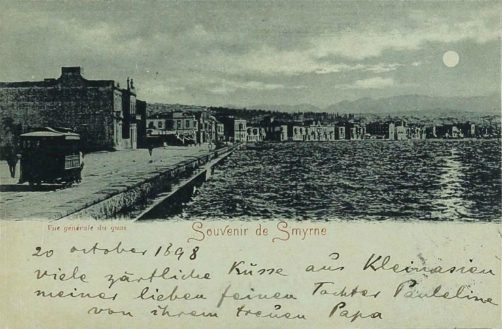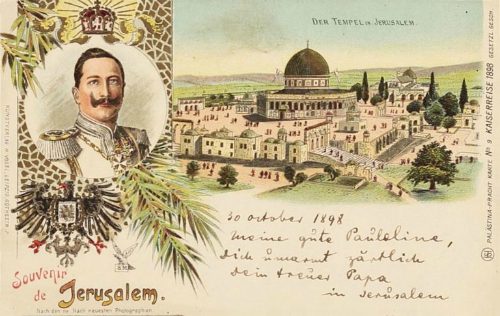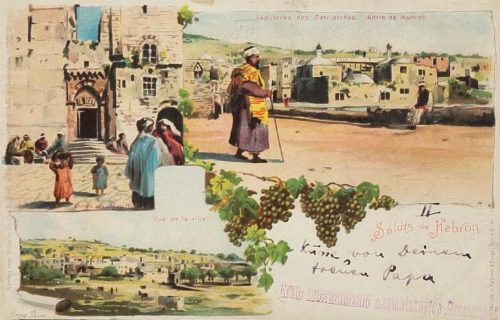This piece comes to Rocky Mountain Jew and the IJN from Nati Gabby of the National Library of Israel. In 2019, the Library is hosting four special events marking the 70th anniversary of Herzl’s interment in Israel. All images are courtesy of the Abraham Schwadron Collection at the Library.
On October 12, 1898, the visionary of the State of Israel, Binyamin Ze’ev (Theodor) Herzl, em-barked on a journey to the Land of Israel in order to advance his great dream — a Jewish state for the Jewish people.
Throughout his journey, Herzl sent regular postcards and letters to his family.
The one-of-a-kind collection of correspondence is housed at the National Library of Israel. The collection features brief greetings, written on postcards, sent to his eight-year-old daughter Paulina, from various stops along the journey.
The inscriptions on each of the postcards are brief, containing one or two sentences in Herzl’s handwriting. But the poignant words shed light on Herzl’s great love for his daughter and his desire to update her on the progress of his trip and reassure her that everything was fine.
The first postcard in the series was sent from Constantinople, soon to become Istanbul. The postcard is dated October 15th, 1898:
“Tender kisses to my delicate daughter Paulina from her faithful Papa”
Herzl had timed his journey to the Holy Land to coincide with a visit by the German Emperor, Kaiser Wilhelm II. The Zionist visionary hoped to discuss the particulars of a future Jewish homeland with the Kaiser.
On the same day on which he sent the above postcard, Herzl wrote the following in his personal journal:
“I have discussed the conditions we should put forth with Bodenheimer [a member of the delegation which accompanied Herzl]. The border of the region: from the river of Egypt to the Euphrates. To stipulate a transitional period with independent institutions. A Jewish governor for the transitional period. When the (Jewish) population in a certain area reaches two-thirds of the total population, the administration, from a political standpoint, will become a Jewish administration.”
Five days later, on October 20, Herzl wrote to his daughter from Smyrna, the Turkish port city of Izmir:

“Many tender kisses from Asia Minor to my good daughter Paulina, from her faithful Papa”
Herzl, already in Athens the very next day, wrote:

“Tender kisses from Greece to my delicate daughter Paulina from her faithful Papa”
The journey stretched on, and on October 29, 1898 reached its climax — the meeting with Kaiser Wilhelm II at Mikveh Yisrael in Jerusalem. Herzl hoped that, with his help, he might receive a special charter for the establishment of a Jewish state from the Turkish Sultan.
A cameraman from Herzl’s delegation was supposed to capture the historic moment, but the amateur photographer missed the photo-op, to Herzl’s great disappoint- ment.
The next day Herzl wrote again to Paulina, this time in a postcard celebrating his meeting with the Kaiser:

“To my good Paulina, tender kisses are sent to you from your faithful Papa in Jerusalem”
The next day, Herzl sent yet another postcard, this time with a picture of Hebron, on which he wrote:

“Kisses from your faithful Papa”
On October 31, Herzl wrote in his journal: “If I remember you in the future, Jerusalem, not with pleasure will I remember you.
“The moldy residues of two thousand years of cruelty, intolerance, and filth lie in the stinking streets. If we ever get Jerusalem, and if it is within my ability, I will clean it first.
“I shall remove everything that is not sacred, I shall set up housing for laborers outside of the city, I shall empty out the nests of filth, destroy them, burn those ruins which are not sacred, and the bazaars I shall move to another place. Preserving the old building style as much as possible, I will erect a modern, convenient, clean and functioning city around the holy sites.”














Would anyone consider an embassy to be holy? Then why is it in the holy city Herzl would ask.